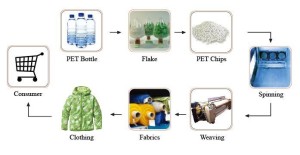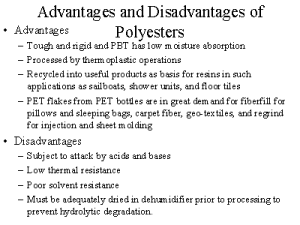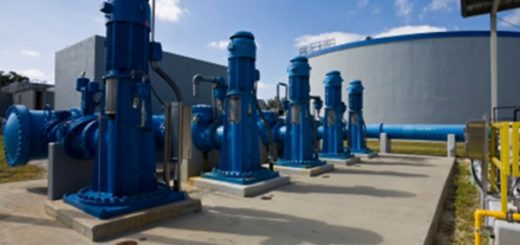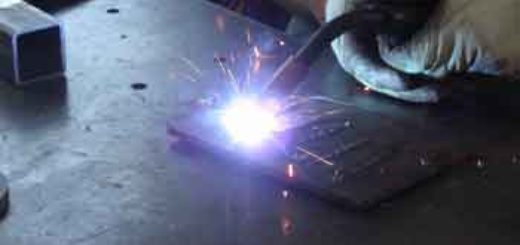The importance and uses of polyesters
The polyester is the choice of fiber and fabric for many industries. It can be applied to many useful purposes, they are very important polymers, Where they are used in clothing, the food, the packaging, the plastic water bottles, and the carbonated soft drinks bottles.
Polyester importance
The polyester as the thermoplastics may change shape after the application of heat, While combustible at high temperatures, They tend to shrink away from the flames and self-extinguish upon ignition.
The polyester fibers have high tenacity and E-modulus as well as low water absorption and minimal shrinkage in comparison with other industrial fibers.
The polyester is a category of polymers that contain the ester functional group in their main chain, it refers to a type called the polyethylene terephthalate (PET), The polyesters include naturally occurring chemicals such as in the cutin of plant cuticles.
They include also the synthetics through step-growth polymerization such as the polybutyrate, The natural polyesters, and a few synthetic ones are biodegradable but most the synthetic polyesters are not.
The polyester is used in the manufacturing of all kinds of clothes and home furnishings like the bedspreads, the sheets, the pillows, the furniture, the carpets, and the curtains.
While clothing is the most popular use of polyester, it is also used to make the plastic bottles, It is also used to manufacture high strength ropes, the thread, the hoses, the sails, the floppy disk liners, the power belting and much more in industries.
The polyester is used in the manufacturing of balloons, These balloons are made of Mylar which is a kind of polyester film, The balloons are made of a composite of Mylar and aluminum foil.
The polyester can also be made into thin films that can be used in the food packaging, the audio and videotapes, the electrical insulation and X-ray films.
The polyester fiber is used as cushioning and insulating material in the pillows, the comforters and upholstery padding, They are also used to make the bottles, films, the tarpaulin, the canoes, the liquid crystal displays, the holograms, the filters, the dielectric film for capacitors, the film insulation for wire and insulating tapes.
The polyesters are widely used as a finish on high-quality wood products such as the guitars, the pianos, and the vehicle interiors, The industrial polyester fibers are used in the yarns and the ropes that are used in Tyre reinforcements, fabrics for conveyor belts, safety belts, coated fabrics and plastic reinforcements with high-energy absorption.
The fabrics woven or knitted from the polyester thread or yarn are used extensively in the apparel and home furnishings, from the shirts and the pants to the jackets and the hats, the bedsheets, the blankets, the upholstered furniture, and the computer mouse.
Characteristics of Polyester Fiber
The polyester fiber is strong, it is resistant to stretching and shrinking, it is resistant to the most chemicals, It is easily washed and it has quick drying.
It is crisp and resilient when wet or dry, It has wrinkle-resistant, it has mildew resistant, it has abrasion-resistant, and it retains heat-set pleats and crease.
Disadvantages of polyester
The main problem with synthetic fabrics like polyester is that they don’t breathe, So, You will feel high humidity all the time and many synthetic fibers also look too shiny and cheap.
Synthetic fabrics don’t give you the same sense of luxury, comfort, and happiness as natural fabrics like cotton, wool, and silk.
Polycarbonate panels advantages and disadvantages
Polycarbonate roofing sheets uses, types & properties















